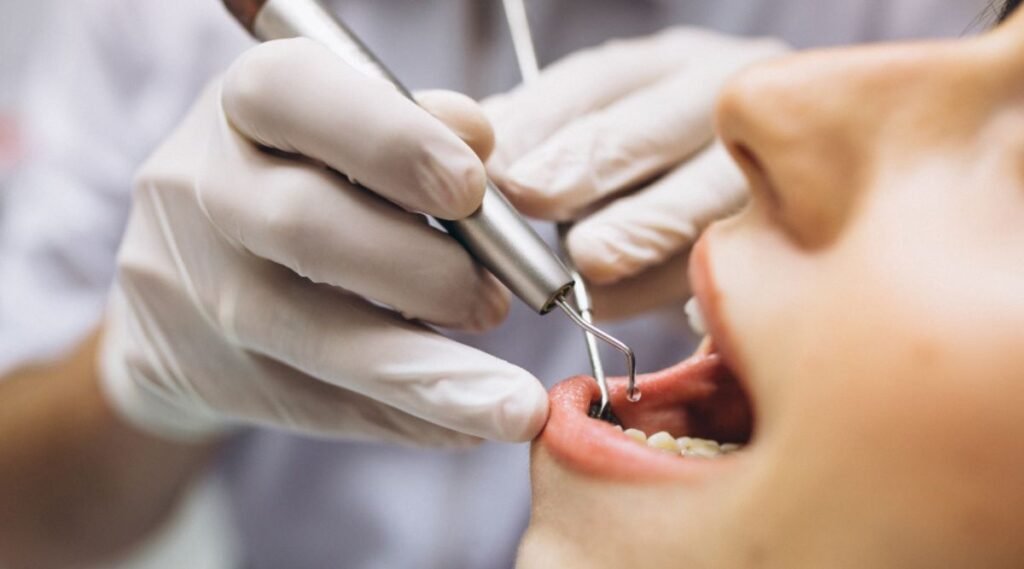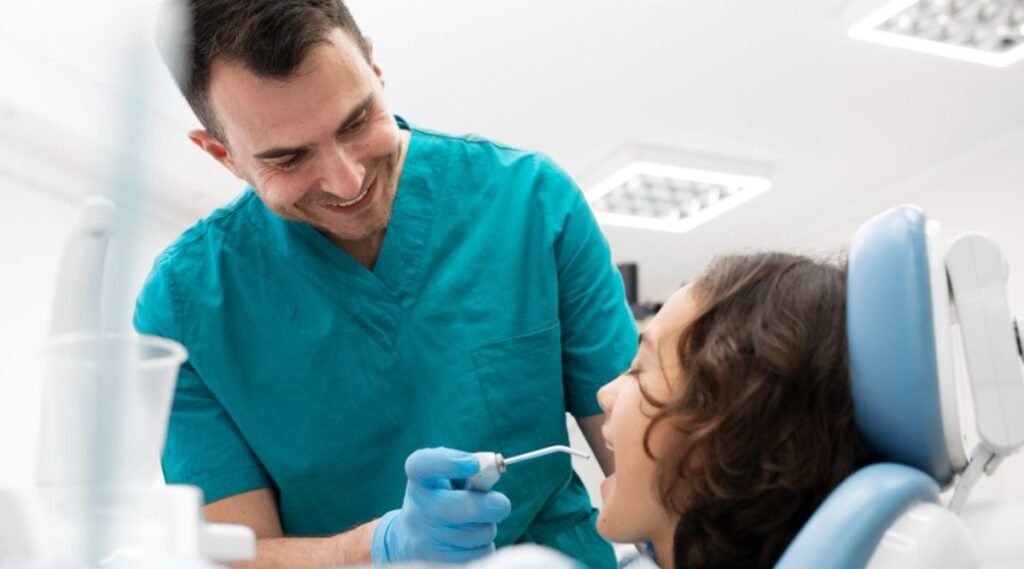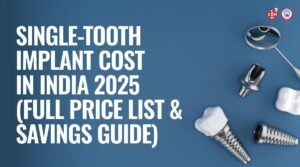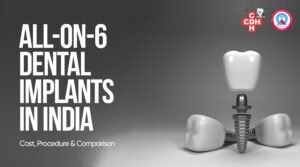Dental implants are nowadays a better option for replacing missing teeth, which can be either a single tooth, multiple teeth, or a completely edentulous jaw. They are essential in regaining proper bite and chewing function, preventing bone loss, supporting adjacent teeth, improving speech, and offering comfort and convenience. By selecting dental implants, people can restore their confidence in eating, speaking, and smiling, enhancing their oral health and well-being.
Suppose you notice anything unusual during your implant process or your recovery period. In that case, we always advise getting in touch with your dentist or dental surgeon right away. Following dental implant surgery, there is a chance of infection, just like with other surgical operations. Infection can develop in the bone supporting the implant, the gum tissue around it, or the implant itself.
The purpose of this article is to inform and empower patients from all over the world about gum problems and how to identify, avoid, and treat them following dental implant surgery. Invest in your dental health and smile by visiting City Dental Hospital in Rajkot. We offer a top-notch dental tourism package for overseas patients for dental treatment like Dental Implants, Full Mouth Rehabilitation, Invisible Aligners, and more.
Understanding Gum Problems After Dental Implants
One of the most frequent reasons for gum disease following implant surgery is poor oral hygiene or not getting the proper treatment at the necessary time, which can result in peri-implantitis, a distinct kind of gum disease, and other infections.
Some of the most common gum issues are
Peri-implantitis
Gums, bones, and other tissues surrounding dental implants can get infected with peri-implantitis. It is a lot like periodontal disease. The level of damage might vary from mild gum inflammation to severe jaw and tooth deterioration. This frequently results in people losing their dental implants and experiencing other severe dental issues if treatment is not received.
Infection
The most common reason is an infection near the implant. The location and severity of a disease determine how it should be treated. For example, a soft tissue graft or antibiotics may be required to treat a bacterial infection in the gums. A bone and soft tissue graft may be necessary for a bacterial infection in the bone once the infected bone tissue and implant have been removed.
Gum Recession
In certain situations, a person may notice that the gum tissue around the implant begins to shrink. This may result in inflammation and pain. Seeking an early evaluation from a dentist is crucial to avoiding implant removal.
Several risk factors can increase the possibility of complications following dental implant surgery. They may also increase problems with dental implants.
- Poor oral hygiene: If you already have dental issues, such as gum disease or tooth decay, you run a higher risk of complications before and after dental implant surgery.
- Smoking: Smoking raises the chance of implant failure and may hamper the healing process.
- Medical conditions: Several medical conditions, including diabetes, cancer, and autoimmune diseases, might make dental implant surgery more complicated.
Signs and Symptoms to Watch For

The early symptoms and indicators of periodontal or gum disease can differ from person to person. On the other hand, many people with gum disease experience a few common symptoms. Among these symptoms are:
- Bad breath
- Loose teeth
- Swollen on Gums
- Gums Bleeding
- Delicate gums and teeth
- Tender gum line
- Receding gums or gum tissue
- Gum inflammation and infection
- Loss of teeth over time
If you are experiencing any of these symptoms, it is essential to schedule an appointment with your dentist as soon as possible. Gum disease is regarded as a dangerous condition that, if ignored, can result in tooth loss.
Prevention Strategies
Once the implant operation is completed, which could take many months, the following procedures are essential to maintain oral hygiene. It would help if you put some effort into maintaining the quality of a new dental implant and improving oral health. Maintaining oral health requires precautions, as food particles might attach to artificial materials more than natural teeth.
Bruising twice a day
It may seem simple, but brushing twice daily is your first line of prevention against gum disease. Use a non-abrasive toothpaste. Whether you choose an electric, sonic, or manual toothbrush, make sure the toothbrush has soft bristles.
Flossing

Floss every day to prevent plaque buildup in between your teeth. Make sure to floss all around every tooth, especially the area surrounding the implant. Only push the floss through if it goes through. See your dentist instead to see whether any issues need to be fixed. For further protection, a mouthwash that kills germs can be used in conjunction with a water flosser, which is also an intelligent choice.
Professional Cleanings
Visit your dentist at least once every six months or more frequently if there are any signs of problems or concerns. The dentist will inspect the implant for cracks, infection, and bone loss and suggest resolving any issues.
Making minor adjustments to your lifestyle, such as quitting smoking and adopting a healthy diet, can significantly reduce your risk of gum disease.
Quitting Smoking
Smoking affects the immune system and reduces blood supply to the gums, increasing their vulnerability to infection. Quitting smoking can reduce your overall health and prevent gum diseases.
A Healthy Diet
The secret to keeping gums healthy is eating a balanced and nutritious diet. Our diets directly affect our oral health and can help or hurt our gums. Nutrient-dense food supplies the fundamental components needed for strong, resilient gums.
Treatment Options for Gum Problems

Generally, the severity of the medical condition defines the course of treatment. Disinfecting the implant is the only effective treatment for the early stages of the infection.
Clean the region beneath the gum line to prevent the inflammation from worsening. Laser technology has recently gained popularity among dental professionals due to its effectiveness in sanitizing implant surfaces.
While implant cleansing is a viable treatment option for the infection, its efficacy is limited. If you get the infection, your dentist may suggest bone or gum grafting around your dental implants.
Bone grafting replaces missing bone around the implant and may necessitate implant, crown, or abutment removal. When there is significant gum recession, gum grafting becomes necessary.
Some of the procedures that help to prevent gum disease are:
Scaling and Root Planning
Scaling and root planning are critical components of the periodontal disease control phase. These methods provide effective antimicrobial therapy by mechanically removing bacteria while disrupting their local biological home. Additionally, scaling and root planing reduce endotoxins, which enhances immunity. Early treatment goals include removing calculus and plaque and reducing edema before surgery.
Antibiotic therapy
Your periodontist may prescribe antibiotics alone or in combination with other treatments. They can be inserted into the periodontal pocket, the area between your gums and teeth.
Surgical interventions
Surgical intervention is typically necessary for patients with mild to advanced periodontal disease. Gum disease surgery includes procedures to reduce pockets (flap surgery), bone grafting, and gum grafting.
Expert Insights from City Dental Hospital
City Dental Hospital is the best dental hospital in Gujarat because of its dedication and years of experience. We provide outstanding patient care, clear treatment explanations, affordability, individual attention, and flexible scheduling. Here, we follow very strict and rigid cleanliness rules.
We present dental implants and gum care as the ideal solution while considering three crucial aspects: form, function, and aesthetics. Our implant method is a fantastic option to replace lost teeth; with proper care, it may last a lifetime.

City Dental Hospital’s highly skilled team of implantologists and cosmetic dentists handles every implant case. Each has achieved worldwide expertise in their specific domains.
One of the testimonies from our patient “Rasila Kalaria” from the USA:
“I am grateful to City Dental Hospital and its team. Before coming here, I had several problems, such as chewing difficulty and esthetic issues. But after receiving therapy from here, I’m completely content and joyful. All of the doctors and staff are quite kind. Again, thank you so much to City Dental Hospital.”
Gum disease is marked by inflammation of the gum line, which can spread and impact the surrounding and supporting bone of your teeth. Most of the time, it is painless; City Dental Hospital offers excellent treatment for gum disease and tooth decay. City Dental Hospital provides advanced treatment for gum infections in Rajkot, Gujarat.
Conclusion
A full dental examination is required before a surgeon can determine whether a patient is a good candidate for dental implant surgery. Dental implants have a success rate of 95%, and many patients report an enhanced quality of life.
Nerve and tissue damage, gum recession, and infections are some complications associated with dental implants. If a patient experiences any concerns after obtaining dental implants, they should consult their dentist.
The only way to successfully treat and manage these diseases is to receive professional care. You can also control them with the right care and proper dental hygiene at home. Providing people with access to affordable dental treatment and awareness will help to improve oral health outcomes nationwide and pave the way for a healthier future.
We must prioritize our gum health and get immediate help if this infection or problem arises. It does not matter if you live in another country and wish to discover a better, more affordable dental implant clinic or visit India for dental tourism. Consult City Dental Hospital to learn more about your alternatives and start your journey to a better and healthier life.
At City Dental Hospital, we wish to help you avoid gum disease from the beginning by taking a preventive approach. No matter what kind of dental care you want, we will ensure you are comfortable and confident in your treatment procedure.
Call us today at +91-81000-42000 to take the first step toward a better, healthier lifestyle with City Dental Hospital.














